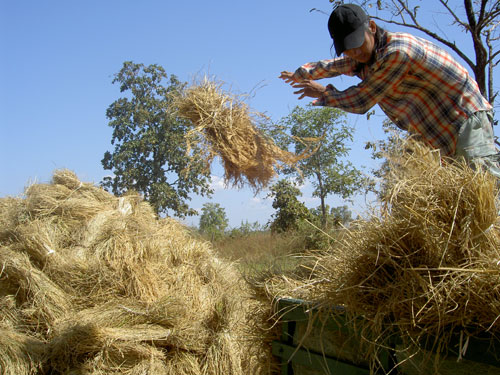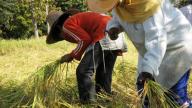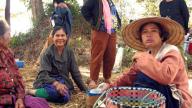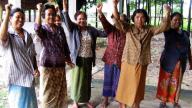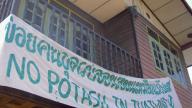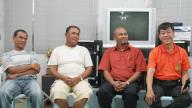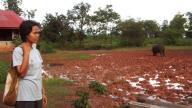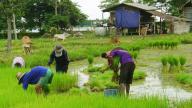The New Thai Capitalism: Development or Disaster?
By Terri Bennett and David Ferris, and originally published by the Common Language Project
Khon Kaen, THAILAND--"Let’s go!" shouts Mannee Boonrod over the cries of barking dogs and the thundering of the monsoon rains on the corrugated tin roof of the temple. This kindly looking lady in her sixties has become something of an activist in recent years, known for her eloquent, forceful speeches and unwavering passion for this community’s struggle. She’s energetically retelling the story of the day three years ago when she and a pack of angry women charged toward 300 of then-Prime Minister Thaksin Shinawatra’s personal guards.
The women were all clad in green t-shirts proclaiming "No Potash!" and waving the matching flags that have become the symbol of their village’s struggle. On that day, Boonrod says with a mischievous smile, flagpoles became weapons as the 70 women aimed them at the groins of policemen blocking the road, threatening to do more than aim if not permitted to see the Prime Minister. The police finally made way, and these women, known locally as "The Iron Ladies," delivered their letter.
The letter outlined their concerns about a proposed potash mine in Udon Thani province: the villagers’ homes and rice fields sit atop one of the world’s largest and highest quality deposits of potash ore. Many residents fear the mine will mean the decimation of their rice fields - and the loss of their livelihoods, their culture, and their way of life. Together they have formed The Udon Thani Conservation Club, a tight knit group dedicated to preventing the mine’s construction.
The Iron Ladies, almost all well above the age of fifty, have over the past five years become the unlikely leaders of a small but sophisticated movement against a transnational corporate giant and its government allies who are united in a quest to industrialize and develop Thailand’s northeast Isaan region.
It’s hard to imagine these mothers and grandmothers from a remote region of rural Thailand having the courage she describes, but as Boonrod says, "If we don’t fight, who will? We realized if no one fights, none of us will survive."
A Shiny Red Rock
At the local headquarters of Canada’s Asia Pacific Potash Corporation (APPC), located amidst rural villages within a few kilometres of the proposed mine site, a middle-aged Canadian man stands in front of a projector screen, sweating through his button-down shirt and khakis in the relentless October heat. He is pointing to a slide of a pretty sunset-colored stone - the kind that beachcombers put in their pockets for souvenirs - while explaining the many industrial uses of potash - key among them the production of chemical fertilizers.
Keith Crosby has worked with Canadian potash mines for 30 years. "Thailand’s lucky," he says. "There are no other potash mines in all of Asia. The Thai people are sitting on a unique deposit here."
He goes on to explain that in 1993 the Thai government agreed to allow APPC access to the potash in Udon. But the company was legally unable to access the mineral because Thailand’s Mineral Act guaranteed landowners’ property rights 350 meters beneath their homes, and the potash deposit was in many places just 100 meters beneath the surface.
In 2002, amendments to the Act passed by Thaksin’s business-friendly government gave APPC rights to mine without consent of the landowners on the surface. Crosby explains with both frustration and excitement that the company has been trying to access the mineral for the past 22 years.
Having been stalled in part by public skepticism of foreign-owned companies, APPC sold to a Thai corporation. Italian Thai Development bought the shares of the company that owned APPC and created its own indirect subsidiary to control APPC’s shares, creating what appears to be a Thai-owned company. The changeover is complicated, but the results seem clear. The new company’s PR department boasts that APPC, soon to be called Thai Mining Company, is "now 100 percent owned by a Thai corporation."
Guinea Pigs
About five years ago, as the proposed Mineral Act amendments were making their way through the legislature, the Conservation Club was formed with the help of a small local NGO, the Salt Study Group of Isaan. The NGO, not the government or the company, was the first to inform the community of the potential mine and its inherent risks.
"The Mineral Act amendments didn’t come from representatives of the people, but from international capital and businesses looking to access these resources," says Suvit Gulabwong, an activist from the Salt Study Group. "There is nothing in the law to say if the company makes mistakes how the project would stop. This is a fight between those who protect rights and those who take them away."
Villagers questioned the constitutionality of - and the motives behind - the Mineral Act changes, and organized in order to fight the amendments. "Overall, we can say that Thai law is not sacred," says Naorawat Daereong, an active club member. "The law is on the side of the capitalists, not the people."
Much of the community shares this sentiment. "This law was not made with us in mind," says Sunee Puedpakwan, one of the Iron Ladies. She sits on the floor on a straw mat and shakes a fist in the air as she says, "No one has the right to take our rights away!"
Although strip mining has occurred in nearby provinces, underground mining is something new in Thailand. Villagers fear that the country’s first attempt at underground mining will have an environmental impact that destroys their farmland and their way of life. APPC is heavily reliant on engineering experience in Canada, and little attention has been paid to the geological differences between the regions: soil composition, prolonged rainy seasons, and the fact that the area where potash is mined in Saskatchewan was uninhabited when mining began, unlike in Udon Thani. "We are not ready to give up our land and our resources," says Daereong. "We are being used as guinea pigs."
According to a Health Impact Assessment (HIA) performed by the Thai Ministry of Public Health at the request of the Conservation Club, the most harmful anticipated effect of the mining is the contamination of groundwater. Chemicals from mineral processing and huge amounts of salt byproduct - a pile expected to be 40 meters tall by a kilometer long - are to be stored on a hill between two watersheds directly above the area’s shallow underground reservoir. This is the region’s primary water source; Ministry officials who performed the assessment contend the proposed chemical storage site is the worst possible choice from a community health perspective.
Villagers fear the effects outlined in the HIA will threaten their futures as rice farmers. "Our soil, our streams, our air, our rain are good," Noopian Phochalee, one of the fiercest Iron Ladies, known to hunt birds with a slingshot in her spare time, explains. "Why make them polluted?"
Some villagers also question the prevailing model of development. The local government and the company claim anti-mine villagers are uneducated about economics, uninformed about development, and unnecessarily skeptical of modernization. Phochalee angrily responds, "If development means you have enough food to eat and have a good life, then we can say that this place is developed! In all their projects, they never look at how people live. This potash mine will offer no benefits for anyone here."
A Village Divided
Back in APPC’s boardroom, those in favor of the mine make clear that they do understand how people live, and that the mine offers many benefits. Udon Thani is a poor province, they explain. Crop yields are the lowest in the nation. Villages here have disproportionately small young adult populations because many migrate to find wage-based work to supplement their families’ incomes.
Crosby argues that the mine will create 900 jobs, and that thousands more will follow from the introduction of the industry. "The people in Isaan are the poorest in Thailand. Don’t tell me they don’t want jobs. 99.9% of them do."
A significant number of residents do eagerly await the mine, hoping to fill the jobs APPC promises. These villagers are typically wage laborers, unlike the landowning farmers that make up the Conservation Club and the Iron Ladies, and have suffered from the lack of available work. Many are children or grandchildren of families that migrated from farmland to the small city of Udon years ago, attracted by a bustling urban economy bolstered by the presence of US soldiers during the Vietnam War, an economy that has stagnated since.
Company representatives and pro-mine villagers trust that potential environmental effects can be easily avoided. It is the Environmental Impact Assessment (EIA) made by the company itself, not the Ministry of Health’s HIA, which will determine whether public safety risks are sufficient to stop the project from going forward.
Pro-mine villagers say they have faith in the assertions of Italian Thai’s public relations people. One of the villagers APPC has invited to their office says, "I really trust their regulations, strategies, and planning. Of course there will be effects, but they are controllable." He also sees the mine as part of the makings of a sustainable economy, one that offers opportunities for the future. "The mine will need experts in things like welding and operating the new equipment. Local people will have these skills long after the mining jobs are gone."
"Italian Thai is a good company with good people," says Crosby, standing next to a detailed model of the mining site. "It’s technology that solves environmental problems."
Not Governments but Gods
The potash mine isn’t on the agenda handed out at "Gold Doesn’t Always Glitter," an international forum on mining policy held by the Asia Pacific Forum on Women Law and Development (APWLD) in the foggy mountains of Loei Province. Still, potential potash-affected villagers are here, listening with attentive, anxious stares as Rupina Batiel Moyaen describes how the copper mines near her home have destroyed her village.
Moyaen, an activist from the Philippines, is somber and stares ahead at no one as she explains, "We were one day faced with a giant enemy. We had no one to help represent the people and their interests." The mine near Moyaen’s village discharged acid mine waste, including cyanide, lead, and arsenic into a nearby river. The owner, Lepanto Consolidated Company, assured villagers the water discharged was the same quality as drinking water. But later an international NGO became involved and performed medical tests on villagers who had become ill, proving Lepanto’s claims about water safety were false.
"We had no choice but to resist," says Moyaen. But being part of the struggle was as dangerous as the mine’s health effects. "Many who struggled were killed or they are missing. There are unidentified armed men. It’s getting worse. The military is there to protect the company, not the people." Women and children fled the region to safety. Moyaen was summoned to the military barracks three times for interrogation.
In an effort to save their land, their lives, and their livelihoods, villagers find themselves forced into sometimes perilous struggles. Judy Pasimio, director of APWLD explains: "It’s about power shifts. Government and local leaders hand their power over to transnational corporations. The company becomes like a government in the area? These companies have become like gods, not just governments, but gods."
This life-threatening shift in power is most evident in places like the Philippines, where the military is commandeered on behalf of corporations to silence resistance, but many activists worry that there is an international trend toward the destructive alliance of government and corporations.
Udon’s Conservation Club is well aware of the risks of resisting. Members recall hassles from hired thugs they believe are paid by Italian Thai, questions from nosy soldiers about why they are meeting together, and even death threats received by Boonrod.
"They threaten my life, but I don’t fear that," she says, "I’m not doing anything wrong. I’m just living my life. Why do they want to kill me?" While at one time her family discouraged her involvement in the struggle and asked her to step back for her own safety and theirs, they now understand the importance of Boonrod’s work. "I have the ability to be a leader, and society accepts me. I am not afraid."
"It would be helpful if government could represent the people," says Gulabwong, who has long protected the Salt Study NGO’s office with loud, trained dogs. Against whom he is defending it, he is unsure: "The government and bureaucrats are both the agents of corporations." But he does know that NGO’s small, ramshackle wooden office has the only comprehensive documentation of the potash struggle, and that one case of arson could mean the end of the organization.
Fighting for our Lives
Boonrod, the Iron Ladies, and activists from the mining conference have all been described as ignorant and fearful of development. Some have been called terrorists. But these women feel they are involved in a fight for their lives. They are of course fighting against the companies, their governments, and the mines affecting them, but they are also challenging a democracy that can seem more interested in serving the interests of corporations than the people. They are challenging a world where the importance of way of life, community ties, and the ability to make meaningful choices about one’s own livelihood are disregarded as irrational and backwards.
On the way back to the village for dinner, the Iron Ladies point out a little house, like a child’s playhouse, that serves as their community radio station, where Conservation Club members broadcast news about the struggle. They point out the community rice field, which is now organic, as villagers refuse to use chemical fertilizers that contain potash. The sticky rice is nearly ready to be harvested, and the women wave and yell to little specks in the field, their neighbors, who are taking their turn tending to the fields. The profits from the harvest will go directly to the Conservation Club, and all of the club’s members work the fields.
At home, the Iron Ladies sit on a bamboo mat Puedpakwan wove the day before. The battle seems unending, she tells us, but the villagers’ resolve is strong. "They say we cannot fight against the power of money," she says, "but we will fight anyway. We will fight for our well being and for our lives. We will fight until we die."
